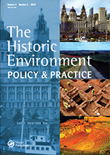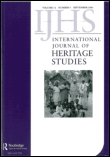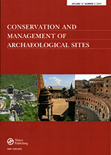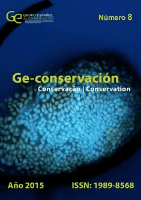
Historic Environment-Policy & Practice
Scope & Guideline
Connecting Heritage with Insightful Policy.
Introduction
Aims and Scopes
- Heritage Conservation and Management:
The journal emphasizes research on best practices in conserving and managing heritage sites, both tangible and intangible, while considering socio-cultural and environmental contexts. - Cultural Sustainability:
It explores the principles of cultural sustainability, focusing on how heritage can be preserved while ensuring its relevance and value to contemporary society. - Policy Development:
The journal discusses the formulation and implementation of policies aimed at protecting and promoting cultural heritage, examining the roles of various stakeholders in these processes. - Community Engagement and Participation:
Research published in the journal highlights the importance of community involvement in heritage conservation efforts, aiming to foster a sense of ownership and responsibility among local populations. - Interdisciplinary Approaches:
The journal encourages interdisciplinary research that integrates insights from fields such as archaeology, environmental science, sociology, and urban planning to address complex heritage issues. - Impact of Global Issues on Heritage:
It addresses how global challenges, such as climate change, conflict, and urbanization, affect cultural heritage and the strategies for mitigating these impacts.
Trending and Emerging
- Climate Change Adaptation:
There is a growing focus on how climate change impacts heritage sites and the development of adaptive strategies to mitigate these effects, reflecting urgent global environmental concerns. - Post-Conflict Heritage Management:
Research addressing the management of cultural heritage in post-conflict settings is emerging, emphasizing the need for reconciliation and restoration in war-torn regions. - Intangible Cultural Heritage:
An increasing number of studies are exploring intangible aspects of heritage, such as community practices and oral histories, showcasing their importance alongside tangible heritage. - Community-Led Heritage Initiatives:
The trend towards participatory and community-led approaches to heritage conservation is gaining momentum, highlighting the role of local voices in decision-making processes. - Interdisciplinary Frameworks:
There is a notable trend towards using interdisciplinary frameworks that bring together various fields to address complex heritage issues, enhancing the depth and applicability of research.
Declining or Waning
- Traditional Heritage Narratives:
There has been a noticeable decline in papers focusing solely on traditional narratives of heritage that do not incorporate contemporary issues or community perspectives. - Static Conservation Methods:
Research on rigid conservation practices without consideration for adaptive reuse or sustainability has decreased, as the field moves toward more dynamic and responsive approaches. - Historical Preservation without Contextual Awareness:
Papers that solely emphasize historical preservation without linking it to current socio-political contexts or community needs are becoming less frequent. - Overemphasis on Aesthetic Value:
The focus on the aesthetic value of heritage sites without addressing their social, cultural, or economic impacts has waned, reflecting a broader understanding of heritage's multifaceted importance. - Isolation of Heritage Studies:
There is a declining trend in studies that treat heritage as a standalone subject, without considering its intersection with environmental, social, and economic issues.
Similar Journals

International Journal of Heritage Studies
Elevating heritage scholarship to new heights.Welcome to the International Journal of Heritage Studies, a prestigious publication dedicated to advancing knowledge in the fields of heritage conservation, cultural studies, and museology. Published by Routledge Journals, Taylor & Francis Ltd in the United Kingdom, this journal boasts an impressive impact ranking, positioned in the Q1 category for multiple disciplines, including Conservation and Cultural Studies, and a remarkable HIndex indicative of its influence within academia. With a history spanning from 1994 and continuing to 2024, the journal serves as an essential platform for researchers, professionals, and students aiming to contribute to the dynamic discourse surrounding heritage preservation and cultural management. Although the journal does not offer open access, it remains a vital resource for those interested in the nuanced intersections of heritage and society, as evidenced by its high ranks in various academic categories. The International Journal of Heritage Studies is committed to fostering innovative research and critical analysis in its field, inviting submissions that explore diverse methodologies and theoretical perspectives.

Journal of Historic Buildings and Places
Bridging History and Modernity in Building Conservation.The Journal of Historic Buildings and Places, published by the esteemed Ancient Monuments Society, is a pivotal platform dedicated to advancing the study and preservation of historic architecture and cultural heritage. With an ISSN of 2753-2453, this journal serves as a sanctuary for researchers, professionals, and students who are passionate about exploring the significance of historic buildings, landscapes, and places. Its commitment to open access publication ensures that critical findings in the field are readily available to a global audience, thus facilitating wider dissemination of knowledge and fostering collaborative engagements among scholars. The journal contributes significantly to the ongoing discourse on conservation practices, architectural history, and heritage management, making it an essential resource for anyone committed to the study and preservation of our architectural legacy.

Conservation and Management of Archaeological Sites
Championing Best Practices in Cultural Heritage Management.Conservation and Management of Archaeological Sites is a pivotal academic journal published by Routledge Journals, Taylor & Francis Ltd, focusing on the interdisciplinary fields of archaeology and conservation. With an ISSN of 1350-5033 and an E-ISSN of 1753-5522, this journal strives to publish high-quality research that addresses critical topics related to the conservation and management of archaeological sites, fostering dialogue between practitioners, researchers, and policymakers. Despite being categorized in the third quartile (Q3) across multiple relevant categories such as Archaeology and Conservation in the 2023 rankings, it remains a significant resource for professionals seeking to enhance their understanding and application of best practices in site management. The journal plays a crucial role in disseminating knowledge that contributes to the preservation of cultural heritage, making it an essential read for anyone involved in these vital fields. Published since 1995, the journal not only reflects the growing importance of archaeology in today's society but also provides a platform for emerging research that will shape future conservation strategies.

Ge-Conservacion
Uniting Disciplines for a Sustainable Cultural LegacyGe-Conservacion, published by GRUPO ESPANOL I I C, stands as a pivotal journal in the fields of Conservation, Museology, and Visual Arts and Performing Arts, facilitating an open-access platform since 2009. Based in Spain, this journal serves as a vital repository for innovative research and scholarly dialogue, significantly impacting the community with its Q1 and Q2 rankings across several categories in 2023. With an objective to advance multidisciplinary understanding and practices related to cultural heritage conservation, it attracts a diverse readership of researchers, professionals, and students eager to engage with contemporary issues and methodologies. The journal's commitment to accessibility enhances its reach and influence, making it an essential resource for anyone passionate about preserving the integrity and significance of our artistic and historical treasures.

Tourism
Innovating insights for contemporary travel challenges.Tourism is a distinguished academic journal dedicated to the exploration and advancement of knowledge within the fields of geography, planning, and tourism management. Published by INST TOURISM in Croatia, this journal serves as an essential platform for researchers, practitioners, and policymakers from around the globe. It boasts a strong academic reputation, as evidenced by its 2023 quartile rankings—Q2 in Geography, Planning and Development, and Q3 in Tourism, Leisure and Hospitality Management—demonstrating its significant contribution to the disciplines it encompasses. Although it is not an Open Access journal, Tourism promotes rigorous peer-reviewed research that addresses contemporary issues and challenges in the travel and hospitality sectors, making it invaluable for those seeking to bridge theory with practice. The journal continues to shape the landscape of tourism research, encouraging innovative studies that reflect the changing dynamics of the global tourism industry. From its inception in 2002 to the projected coverage through 2024, the journal remains committed to fostering academic dialogue and collaboration.

Journal of Heritage Tourism
Cultivating a Deeper Understanding of Heritage and TourismJournal of Heritage Tourism, published by Routledge Journals, part of Taylor & Francis Ltd, is a leading peer-reviewed journal dedicated to the interdisciplinary study of heritage tourism. As a vital resource for researchers, professionals, and students in the fields of History and Tourism, Leisure and Hospitality Management, this journal has consistently achieved high rankings, securing a Q1 quartile in History and Q2 in Tourism for 2023. With an impressive Scopus rank of #3 out of 1760 in Arts and Humanities - History and #42 out of 146 in Business - Tourism, it underscores the journal’s importance and relevance in contemporary scholarship. Spanning contributions from 2006 to 2024, the journal provides a platform for innovative research, critical discussions, and comprehensive analyses, fostering a greater understanding of the complex relationships between heritage and tourism. Although it does not currently offer open access, insights published within this journal remain accessible for institutional libraries and academic communities worldwide, ensuring that the ongoing discourse around heritage tourism flourishes.

International Journal of Intangible Heritage
Fostering Global Conversations on Heritage.The International Journal of Intangible Heritage, published by the NATL FOLK MUSEUM KOREA-NFMK, stands as a premier platform dedicated to the exploration and preservation of intangible cultural heritage. With an ISSN of 1975-3586 and an E-ISSN of 1975-4019, this journal has successfully carved a niche in the fields of Conservation, Cultural Studies, and Museology, achieving Q1 categorization across these disciplines in 2023. It ranks impressively in Scopus, being #17/83 in Museology and #33/103 in Conservation, highlighting its significant contribution to the academic discourse in these fields. Published in South Korea, this journal not only serves as a vital resource for researchers and professionals but also engages students aspiring to enhance their understanding of intangible heritage. Accessible without an open access model, it features a blend of scholarly articles, reviews, and case studies from 2011 through 2024, making it a robust repository for current and emerging practices in the safeguarding of cultural expressions. By fostering innovative dialogue among scholars and practitioners globally, the International Journal of Intangible Heritage plays a crucial role in the ongoing dialogue surrounding the value and significance of intangible cultural assets.

PRESERVATION
Celebrating the Legacy of Cultural HeritagePRESERVATION is a distinguished journal published by the NATL TRUST HISTORIC PRESERVATION, focusing on critical issues in historic preservation and conservation within the realm of arts and humanities. With an ISSN of 1090-9931, this journal served as a notable platform for research and discourse from 2002 to 2018, although its coverage was discontinued in Scopus, where it held ranks that reflected its niche but valuable contributions to both visual arts and conservation. Despite its cessation, the journal remains a key resource for professionals and academics dedicated to preserving cultural heritage and advancing the study of preservation practices. The importance of PRESERVATION lies in its commitment to fostering an understanding of the challenges in maintaining historical integrity amidst modern developments. Researchers, practitioners, and students alike will find a wealth of knowledge and inspiration through its past issues, making it an essential reference point for those engaged in the ongoing dialogue around preservation methodologies and impacts.

Ager-Revista de Estudios sobre Despoblacion y Desarrollo Rural
Bridging Research and Rural TransformationAger-Revista de Estudios sobre Despoblacion y Desarrollo Rural, published by PRENSAS UNIV ZARAGOZA, is a distinguished academic journal focused on the critical fields of demography, rural development, and geography. With an ISSN of 1578-7168 and E-ISSN of 2340-4655, this journal serves as a vital resource for researchers, professionals, and students dedicated to understanding the dynamics of population decline and sustainable development in rural areas. The journal has gained recognition for its quality, evidenced by its placement in the Q3 category across multiple domains in the 2023 rankings, including Demography, Development, and Geography, Planning and Development. Additionally, it holds impressive Scopus ranks, notably at 48th percentile in Demography and 78th percentile in Anthropology. With contributions from eminent scholars and practitioners, Ager not only disseminates high-quality research but also nurtures discourse on policy implications and innovative solutions for rural challenges. The journal is open access, fostering broad accessibility and encouraging scholarly dialogue in the critical study of population and rural development. Whether you are a seasoned researcher or an emerging scholar in the field, Ager provides a platform for impactful insights and collaboration in tackling pressing rural socio-economic issues.

METU Journal of the Faculty of Architecture
Exploring the intersection of theory and practice in architecture.METU Journal of the Faculty of Architecture is a reputable academic publication dedicated to advancing research and discourse in the field of architecture. Published by MIDDLE EAST TECHNICAL UNIVERSITY in Turkey, this journal serves as a vital platform for scholars and practitioners, addressing both theoretical and practical topics relevant to contemporary architectural studies. With an impact factor that positions it in the Q3 category for architecture as of 2023, and a Scopus rank of #133 out of 189 in Engineering Architecture, the METU Journal is an influential resource for innovative ideas and studies. Encompassing a wide range of scholarly articles, it fosters academic collaboration between researchers and professionals, making it essential reading for anyone passionate about the evolution of architecture. Though not open access, it provides crucial insights and rigorous research from 2008 up until 2024, contributing significantly to the global discourse on architectural practices and theories.